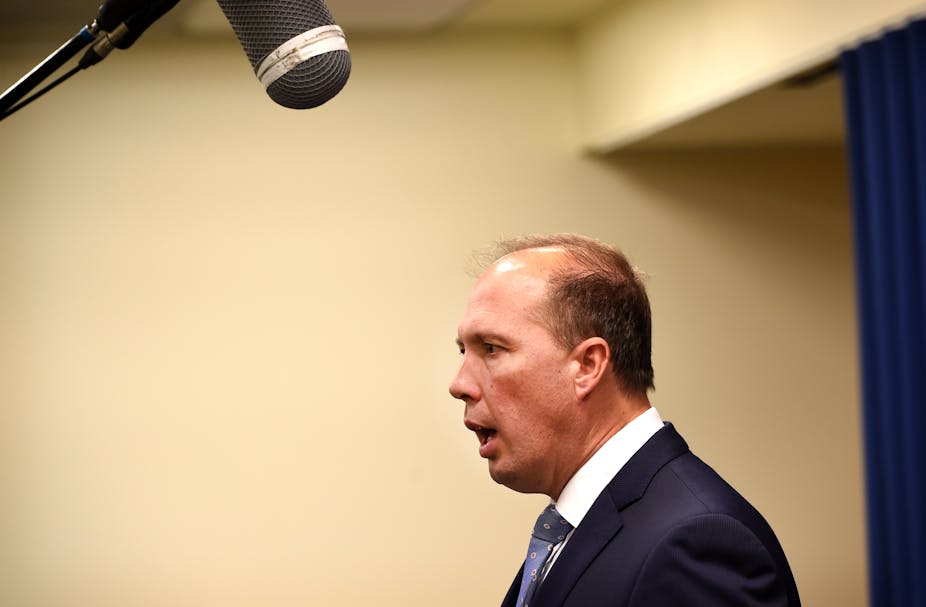Immigration Minister Peter Dutton always sounds put upon. This week he was bleating about Guardian Australia and the ABC “defaming” him, and those pesky people who care about what’s happening in Nauru leaking documents.
Dutton might remember that a good minister solves problems. A bad one whinges, whips up fear, invents things, and puts point-scoring above policy.
Malcolm Turnbull should make resolving the future of those on Nauru and Manus Island Dutton’s immediate priority, and give him a timeframe.
After Turnbull was heckled by a handful of protesters during his Wednesday CEDA speech, he asked the police for a report and CEDA to explain how the disruptors got into the room. He should also have put a few questions to Dutton.
Such as these. Why, with no boats arriving for a long time, do we still have this offshore issue? Why are we perpetuating it, allowing people to be treated inhumanely and Australia to be internationally embarrassed? Why can’t this government juggle deterrence and resettlement in Australia, as the Howard government finally was forced to do?
The government claims credit for stopping boat arrivals, but it has lacked the wit or will to clear the offshore centres.
To be fair, it is not just Dutton who has failed, or his predecessor Scott Morrison.
Foreign Minister Julie Bishop tried unsuccessfully to get an agreement with Iran to compulsorily return people found not to be refugees. She was part of a deal with Cambodia to take some refugees – but hardly anyone has gone there. And she was involved in negotiations with Papua New Guinea, which so far has settled only a handful of the Manus people into the community – Dutton has confirmed the number is fewer than 20.
Dutton on Thursday railed about the leaking of more than 2100 Nauru incident reports to Guardian Australia and accused Save the Children of being the source (which it strongly denied).
He told the ABC: “The trouble, frankly, with the approach of the Guardian and the ABC has been to trivialise the very serious issues by trying to promote the 2,100 reports as somehow, all of those being serious when they’re not”. Many related to parents’ corporal punishment of their children, he said, and “some minor assaults by detainees on detainees, refugees on refugees”.
Moreover, “people should be a little more circumspect because my desire, the government’s desire, is to treat people with dignity … I’m not going to be defamed by the Guardian and by the ABC because we are doing everything within our power to provide support for people”.
When it comes to defaming, Dutton can hardly talk, remembering how he denounced in extravagant terms Greens senator Sarah Hanson-Young over her claim, later vindicated, that she was spied on in Nauru.
Dutton likes to emphasise how it was Labor that re-established the offshore centres. That’s true, but if Labor hadn’t done so, the Coalition government would have. The Abbott opposition endlessly pressed the point.
The minister crafts the facts to his case. When in April the PNG Supreme Court said holding asylum seekers was illegal and the PNG government foreshadowed the Manus Island centre would go, the Australian government was anxious both to kick the matter beyond the election and to get some solution short of closure. Dutton tried to portray it as PNG’s issue.
Now he has another line. “The closure of Manus will be the next dividend in the success of stopping the boats,” he said this week after his talks with PNG Prime Minister Peter O'Neil. Well no, Peter: the closure of Manus – for which, despite the hype, there is no public timetable – will be the “dividend” of the PNG court decision.
Dutton remains adamant that no refugees from Manus will be allowed to come to Australia. They must either go to their home countries – despite being found to be in genuine fear of persecution – or settle in PNG, where they are clearly not welcome.
It should be noted that of 551 Manus men assessed by the PNG government as at the end of May, 98% had been found to be refugees. On Nauru, it was 77% of those assessed. Dutton has confirmed there is no third country in prospect for resettlement. He won’t countenance a country such as New Zealand, believing that would encourage the people smugglers.
Unless Turnbull wants to have this issue dog his prime ministership, an acceptable resettlement country or countries must be found soon or he should have the government bite the bullet and bring the people to Australia. Eventually Australia’s hand could be forced in relation to the Manus men if the PNG government ran out of patience – or couldn’t be bought off – and insisted Australia take responsibility for them.
The conclusion that the Australia option would mean the boats would inevitably start to arrive doesn’t follow. There is formidable sea power at the government’s disposal to stop them, and relations with Indonesia are at present positive enough to get co-operation in preventing people leaving.
It was notable this week that Western Australian Premier Colin Barnett, while specifically not urging the government to bring families from Nauru to Australia, said that if it did, “we would certainly accommodate a number of them in Western Australia and we’d certainly support them as a state government”. And that from a leader soon facing a difficult election.
Turnbull’s loss of authority complicates finding a solution. If he’d had a thumping election victory he’d be in a better position. As it is, if he acted decisively, the conservatives on the backbench and their media cheer squad could turn it into another mark against him. Dutton, one of the conservatives’ leaders and heroes, no doubt has an eye on his own base in dealing with the issue.
But sooner or later Turnbull surely has to do what he knows he should do. At least, one hopes.

